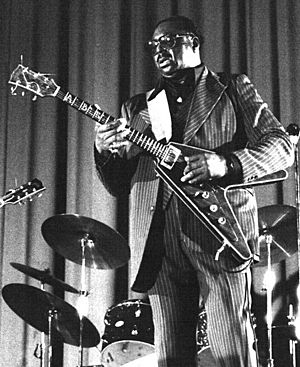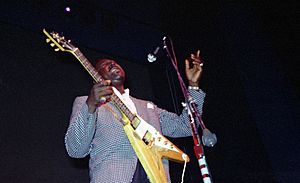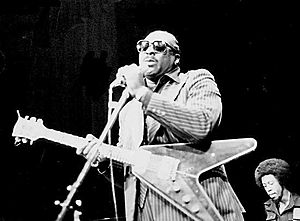Albert King facts for kids
Quick facts for kids
Albert King
|
|
|---|---|

King in 1978
|
|
| Background information | |
| Birth name | Albert Nelson |
| Born | April 25, 1923 Indianola, Mississippi, U.S. |
| Died | December 21, 1992 (aged 69) Memphis, Tennessee |
| Genres | |
| Occupation(s) |
|
| Instruments |
|
| Years active | 1949–1992 |
| Labels | |
| Associated acts |
|
Albert Nelson (born April 25, 1923 – died December 21, 1992) was an American musician. He was known by his stage name Albert King. He was a very important blues guitarist and singer. Many people think he was one of the greatest blues guitarists ever.
Albert King was famous for his album Born Under a Bad Sign (1967). The song "Born Under a Bad Sign" from this album is very well-known. He, B.B. King, and Freddie King were all famous blues guitarists. They were not related but were called the "Kings of the Blues."
Albert King played guitar with his left hand. He had a special, strong sound that many other blues and rock guitarists copied. People sometimes called him "The Velvet Bulldozer." This was because he sang smoothly and was very tall and big. He also used to drive a bulldozer for work when he was younger.
Albert King was honored in the Blues Hall of Fame in 1983. Later, in 2013, he was added to the Rock and Roll Hall of Fame. In 2011, Rolling Stone magazine said he was the 13th greatest guitarist of all time.
Contents
Albert King's Early Life
Albert King was born on a cotton farm in Indianola, Mississippi. When he was a child, he sang gospel songs in church. His father played the guitar in their family gospel group. Albert was one of 13 children. His family moved near Forrest City, Arkansas, when he was eight. There, he grew up picking cotton on farms.
Albert King's real name was Albert Nelson. He started using the name Albert King in 1953. He wanted to be linked to the famous blues musician B.B. King. He even called his guitar "Lucy," just like B.B. King called his guitar "Lucille." B.B. King later said Albert was "my brother in the blues."
When Albert was five, his father left the family. At age eight, he moved with his mother and two sisters. They lived near Forrest City, Arkansas. He said his family also lived in Arcola, Mississippi, for a short time.
Albert made his first guitar from a cigar box and some wire. Later, he bought a real guitar for $1.25. He was left-handed, so he played a right-handed guitar upside down. He worked many jobs, like picking cotton and driving a bulldozer. He did these jobs until he could make a living as a musician.
Albert King's Music Career
Albert King started his music career with a group called the Groove Boys. This was in Osceola, Arkansas. He learned a lot from other blues artists there.
In 1953, he moved to Gary, Indiana. For a short time, he played drums in Jimmy Reed's band. He also played on some of Reed's early songs. In Gary, he recorded his first song, "Bad Luck Blues." It did not become a big hit.
He returned to Osceola in 1954 and played with the Groove Boys again. In 1956, he moved to Brooklyn, Illinois. He started a new band there. He became very popular in the St. Louis area. He played alongside famous musicians like Ike Turner and Chuck Berry.
In 1959, he signed with the Bobbin record label. He released a few songs, but they did not become hits. However, King Records noticed him. In 1961, King Records released his song "Don't Throw Your Love on Me So Strong." This song became his first hit. It reached number 14 on the Billboard R&B chart. This song was on his first album, The Big Blues, in 1962.
After leaving Bobbin, King signed with the Stax record label in Memphis. At Stax, he recorded many important songs. These included "Crosscut Saw" and "As the Years Go Passing By". In 1967, Stax released the album Born Under a Bad Sign. This album was a collection of his songs recorded at Stax. The song "Born Under a Bad Sign" became his most famous song. Many artists, like Cream and Jimi Hendrix, have covered it.
The songs King recorded at Stax had a clear, traditional blues sound. They also felt new and modern. King's success at Stax came from making his songs sound upbeat. This made them more popular and easier to play on the radio.
In 1967, Albert King played at the Fillmore West in San Francisco. He released a live album from one of these concerts, called Live Wire/Blues Power. In 1969, King performed with the St. Louis Symphony Orchestra. He also released the album Years Gone By that year. In 1970, he released an Elvis Presley tribute album. It was called Albert King Does the King's Things.
On June 6, 1970, King played with the Doors in Vancouver, Canada. This performance was released as an album in 2010. In 1971, he released the album Lovejoy. It included his cover of the Rolling Stones' song "Honky Tonk Women".
To stay popular, King started using the new sound of funk. In 1972, he recorded "I'll Play the Blues for You." This song featured the Bar-Kays and the Memphis Horns. He recorded another album with the Bar-Kays in 1974.
In 1975, Stax Records went out of business. King then moved to a smaller record label. His next albums, Albert and Truckload of Lovin' (1976), had a more pop music sound. His album King Albert (1977) also lacked strong songs. King's guitar playing was less important in these albums. His last recording for this label was Live Blues in 1977. This was from his show at the Montreux Jazz Festival.
In 1978, King signed with Tomato Records. He recorded the album New Orleans Heat. He worked with the R&B producer Allen Toussaint. The album had new songs and new versions of old songs.
King took a break from recording for four years. During this time, he went back to his blues roots. He played simple blues music with just guitar, bass, drums, and piano. In 1983, he released a live album called San Francisco '83. It was nominated for a Grammy Award. That same year, he recorded a TV show with the rising blues star Stevie Ray Vaughan. This was later released as an album and DVD called In Session.
In 1984, King released the album I'm in a Phone Booth, Baby. This album was also nominated for a Grammy Award. It included new versions of his old songs.
Albert King continued to tour and play at blues festivals. He had a special tour bus with "I'll Play The Blues For You" painted on the side. His last album, Red House, was released in 1991. It was named after a Jimi Hendrix song.
Before he died, Albert King was planning a tour with B.B. King and Bobby "Blue" Bland.
Albert King's Death
Albert King died from a heart attack on December 21, 1992. He passed away at his home in Memphis. His last concert was just two days before in Los Angeles. His funeral had a procession with the Memphis Horns playing music. He was buried in Paradise Gardens Cemetery in Edmondson, Arkansas. This was near where he grew up.
Albert King was survived by his wife, Glendle, and his children. He also had grandchildren and great-grandchildren.
Albert King's Artistry
Instruments Albert King Used

Albert King's first instrument was a diddley bow. Then he made a cigar box guitar. Later, he bought a Guild acoustic guitar. He is most famous for playing a 1958 Gibson Flying V guitar. He used different Flying V guitars throughout his career. One was even custom-made for him by Tom Holmes.
King was left-handed. But he played right-handed guitars by flipping them upside down. He used a special guitar tuning. This tuning made it easier for him to bend the strings. This string-bending was a big part of his unique sound.
For his sound, King used a special amplifier. It had two large speakers. Later, he also used an MXR Phase 90 effect pedal.
How Albert King Influenced Others
Albert King had a huge impact on many other guitarists. These included Jimi Hendrix, Mick Taylor, Derek Trucks, and Stevie Ray Vaughan. Stevie Ray Vaughan often said King was his biggest influence. Eric Clapton also said that Albert King inspired his guitar playing on the 1967 Cream album Disraeli Gears.
Albert King's Awards and Honors
Albert King was nominated for two Grammy Awards during his career. In 1983, he was nominated for his album San Francisco '83. The next year, he was nominated for I'm In A Phone Booth, Baby.
In 1983, King was added to the Blues Hall of Fame. He received a star on the St. Louis Walk of Fame in 1993. In 2011, he was honored with a marker on the Mississippi Blues Trail in his hometown. He was also inducted into the Memphis Music Hall of Fame in 2013.
Albert King was inducted into the Rock and Roll Hall of Fame in 2013. At the ceremony, musicians like Gary Clark Jr. and John Mayer played his songs.
Discography
Studio albums
- The Big Blues, also known as Travelin' to California (1962)
- Born Under a Bad Sign (1967)
- Years Gone By (1969)
- Blues for Elvis – King Does the King's Things (1970)
- Lovejoy (1971)
- I'll Play the Blues for You (1972)
- I Wanna Get Funky (1974)
- Albert (1976)
- Truckload of Lovin' (1976)
- King Albert (1977)
- The Pinch, also known as The Blues Don't Change (1977)
- New Orleans Heat (1978)
- San Francisco '83, also known as Crosscut Saw: Albert King in San Francisco (1983)
- I'm in a Phone Booth, Baby (1984)
- The Lost Session (1971, released 1986)
Videography
- Maintenance Shop Blues (VHS), PBS (1981)
- Godfather of the Blues: His Last European Tour (DVD), P-Vine Records (2001)
- Live in Sweden, Image Entertainment (2004)
- In Session... Albert King with Stevie Ray Vaughan, Stax, Concord Music Group (2010)
See also
 In Spanish: Albert King para niños
In Spanish: Albert King para niños
 | Isaac Myers |
 | D. Hamilton Jackson |
 | A. Philip Randolph |



